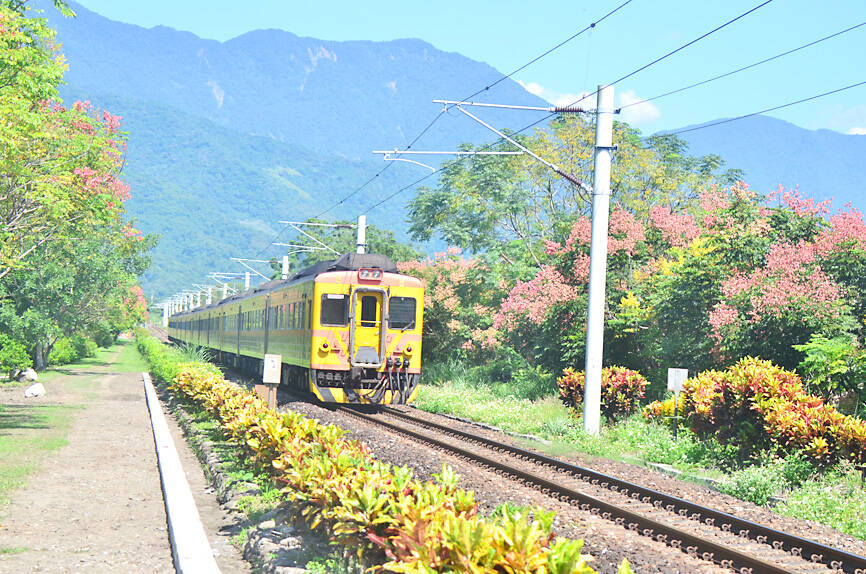Lawmakers yesterday froze 10 percent, or NT$400 million (US$12.6 million), of the Taiwan Railways Administration’s (TRA) budget to improve the safety of railway services until the agency submits a written report on how a staffing shortage would not disrupt railway operations when it becomes a state-run railway corporation next year.
The legislature’s Transportation Committee, which was scheduled to review the budget plans for agencies under the Ministry of Transportation and Communications, expressed concern about problems that have surfaced recently at the nation’s largest railway operator due to a staffing shortage.
Chinese Nationalist Party (KMT) Legislator Hung Meng-kai (洪孟楷) said that it had been reported that some TRA workers had to line up outside the office at midnight to secure paid leave at their preferred dates next year.

Photo: CNA
Hung asked whether a similar phenomenon would occur when the agency becomes a state-run corporation next year, which could lead to numerous lawsuits filed by employees against the newly established firm.
New Power Party Legislator Chiu Hsien-chih (邱顯智) cited statistics from the Taiwan Railway Union, which estimated that 3,000 TRA employees are set to leave their jobs or retire before the agency becomes a corporation next year.
Chiu asked how serious the staffing shortage is and whether the problem would affect TRA services during the Lunar New Year holiday in February.
TRA Director-General Tu Wei (杜微), who is to serve as the first chairman of Taiwan Railway Corp, said that some of the employees at the TRA’s Taipei Rolling Stock Branch did line up to secure paid leave, adding that this did not happen in other branches and departments.
“We think it [lining up to secure paid leave] has something to do with that employees were told that they can begin planning their holidays for next year,” Tu said, adding that it would have an online system for people to file their requests for paid leave.
In the Taiwan Rolling Stock Branch, there must be at least 15 percent of employees who are on call to maintain normal operations, Tu said.
Employees usually have no trouble asking ahead of time to take a few days off , but coordination is needed to arrange work schedules for long weekends or special holidays, Tu said.
As of Oct. 31, only 987 TRA employees had taken advantage of retirement packages and are scheduled to leave next year, Tu said.
“Our most conservative estimate is that as many as 1,300 people would leave, far short of the number estimated by the union,” Tu said, adding that job vacancies that are crucial to maintain normal railway service would be filled first.
The agency is training about 900 employees who were recruited through the Special Examination for Railway Employees this year, Tu said.
About 500 more employees would be recruited after the railway corporation is established next year, he said.

The brilliant blue waters, thick foliage and bucolic atmosphere on this seemingly idyllic archipelago deep in the Pacific Ocean belie the key role it now plays in a titanic geopolitical struggle. Palau is again on the front line as China, and the US and its allies prepare their forces in an intensifying contest for control over the Asia-Pacific region. The democratic nation of just 17,000 people hosts US-controlled airstrips and soon-to-be-completed radar installations that the US military describes as “critical” to monitoring vast swathes of water and airspace. It is also a key piece of the second island chain, a string of

A magnitude 5.9 earthquake that struck about 33km off the coast of Hualien City was the "main shock" in a series of quakes in the area, with aftershocks expected over the next three days, the Central Weather Administration (CWA) said yesterday. Prior to the magnitude 5.9 quake shaking most of Taiwan at 6:53pm yesterday, six other earthquakes stronger than a magnitude of 4, starting with a magnitude 5.5 quake at 6:09pm, occurred in the area. CWA Seismological Center Director Wu Chien-fu (吳健富) confirmed that the quakes were all part of the same series and that the magnitude 5.5 temblor was

The Central Weather Administration has issued a heat alert for southeastern Taiwan, warning of temperatures as high as 36°C today, while alerting some coastal areas of strong winds later in the day. Kaohsiung’s Neimen District (內門) and Pingtung County’s Neipu Township (內埔) are under an orange heat alert, which warns of temperatures as high as 36°C for three consecutive days, the CWA said, citing southwest winds. The heat would also extend to Tainan’s Nansi (楠西) and Yujing (玉井) districts, as well as Pingtung’s Gaoshu (高樹), Yanpu (鹽埔) and Majia (瑪家) townships, it said, forecasting highs of up to 36°C in those areas

IN FULL SWING: Recall drives against lawmakers in Hualien, Taoyuan and Hsinchu have reached the second-stage threshold, the campaigners said Campaigners in a recall petition against Chinese Nationalist Party (KMT) Legislator Yen Kuan-heng (顏寬恒) in Taichung yesterday said their signature target is within sight, and that they need a big push to collect about 500 more signatures from locals to reach the second-stage threshold. Recall campaigns against KMT lawmakers Johnny Chiang (江啟臣), Yang Chiung-ying (楊瓊瓔) and Lo Ting-wei (羅廷瑋) are also close to the 10 percent threshold, and campaigners are mounting a final push this week. They need about 800 signatures against Chiang and about 2,000 against Yang. Campaigners seeking to recall Lo said they had reached the threshold figure over the